Members of the public can view Pennsylvania divorce records because of key laws and statutes, particularly the state’s Right to Know Law and the federal Freedom of Information Act.
As a result, citizens who are required to access divorce records for legal matters, to find out someone’s marital status or to perform genealogy research can do so from state and county databases. Often, they do this at little to no cost.
Regardless of the reasons for obtaining dissolution records, interested parties can find this data using search features that will find the documents, no matter what public agency is holding them.
Accessing Records of Divorce in Pennsylvania (PA)
Divorce records are available to anyone in Pennsylvania due to the passing of the state’s Right to Know Law —this law permits residents to request information and documents from government agencies without needing to provide a reason. Dissolution records are part of court documents and there may be some exemptions to their accessibility.
In some instances, parties to the divorce may elect and petition the courts to seal their records to protect their privacy and that of their children. If the court approves this application, the public can longer view these records except by court order.
Divorce records are documents that prove the termination of a marriage, while decrees are issued at the court that granted the separation. In Pennsylvania, divorce documents cannot be acquired at the State Vital Records Office but must be sought at the county that issued the decree.
Patrons have another option to find divorce records other than official public channels. They may get in touch with third party vendors who diligently search government databases for records that may not be available in state or county agencies. However, copies of records from these sources are not official and cannot serve in legal matters.
Regardless of whether divorce records are public, citizens can obtain statistics of dissolution rates in Pennsylvania via the Centers for Disease Control and Prevention (CDC). As of 2021, Pennsylvania has a relatively low divorce rate of 2.4 per 1000 persons. This data does not distinguish whether the couples were same sex or not.
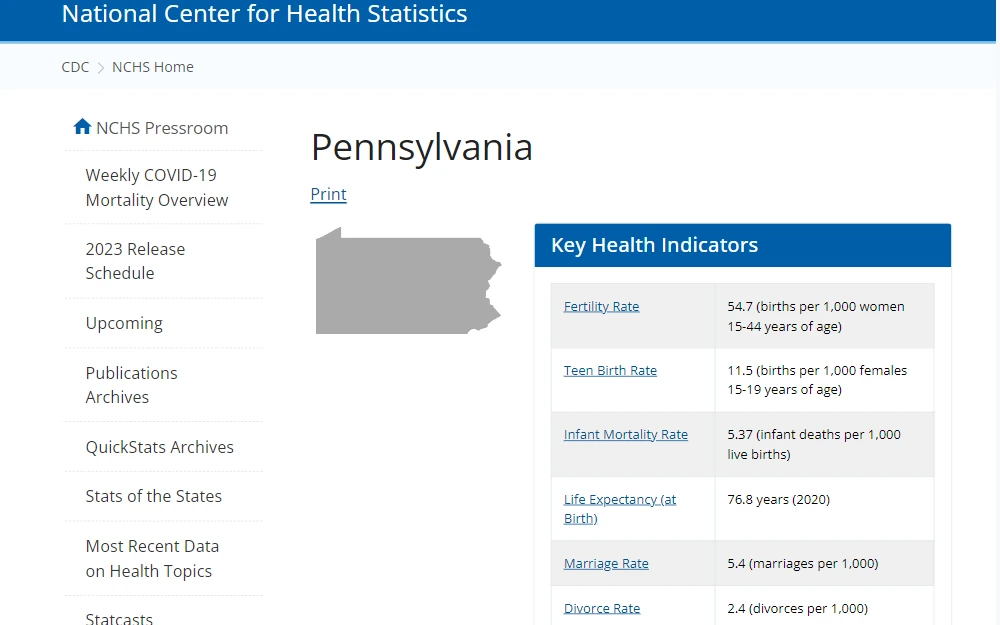
How To Obtain Pennsylvania Divorce Records at No Cost
Citizens who need to find divorce records in Pennsylvania created after 1804 will need to contact the county where the dissolution decree was issued. Dissolution records are generated by the courts, and the primary custodian of these documents are the Pennsylvania Court of Common Pleas also known as Prothonotaries in the respective county.2
To obtain divorce records, interested parties will get in touch with these Courts of Common Pleas; the process to perform this appears in the next section.
Nevertheless, members of the public are still able to view records from each of the courts regardless of the county they were filed. This is done through the Unified Judicial System of Pennsylvania, which furnishes an Online Case Search Tool at no cost to the public. This judicial system is among the oldest justice systems in North America.
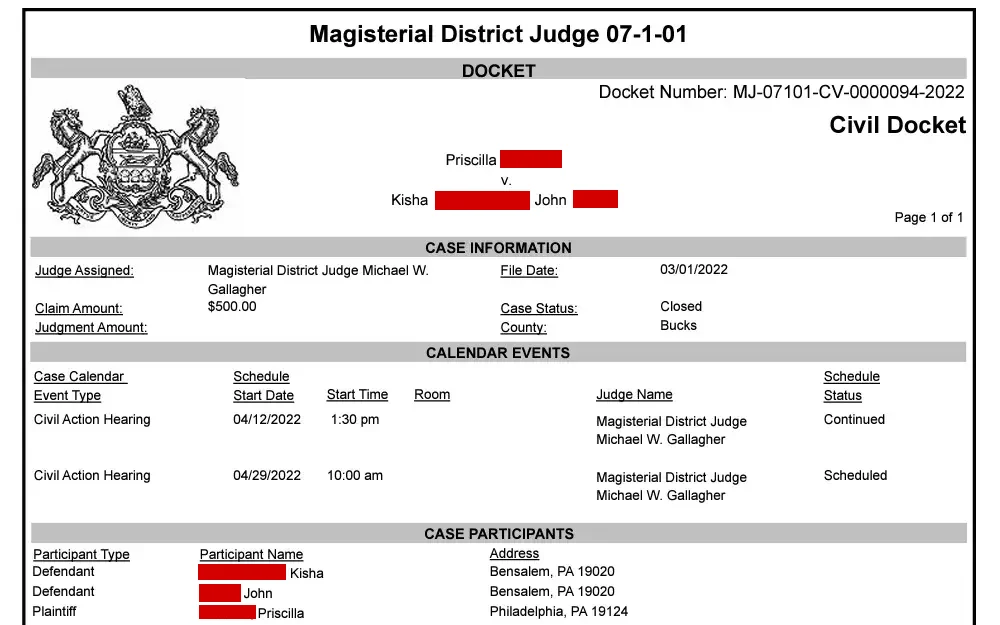
Users can use this tool to find public divorce records using several criteria such as participant name, date filed and docket number. Ensure to select the advanced search checkbox to select the county of interest to find the desired record.
Additionally, interested parties can turn to third-party vendors who can search for these records for a fee—this is particularly helpful if the county where the decree was issued is unknown. However, copies of these divorce documents cannot be used for official purposes if the vendor is not authorized by the Vital Records Office.
Searching Pennsylvania Counties & Cities for Divorce Records
When searching for documents through state agencies, interested parties are afforded a broader search scope to find divorce data—this is achieved through the judicial system rather than the State’s Vital Records office, as mentioned earlier.
Dissolution decrees thus must be acquired from the Judicial Districts that serve each county; this applies particularly to retrieving certified copies of divorce records.4 Turning to individual county courts has some advantages as these offices handle smaller caseloads compared to state agencies, which implies that requests are processed quicker.
To demonstrate how to search for dissolution records, major and populated counties will be used. Pennsylvania’s most populated counties are Philadelphia, Allegheny and Montgomery Counties.
Please note that members of the public can still view these divorce records electronically using the Online Case Search Tool as previously mentioned.
Search for Divorce Certificates in Philadelphia County: Interested parties who are required to find divorce records in Philadelphia County will need to contact the Office of Judicial Records. This can be done either in person at the Civic Filing Center or by sending in a mail request (address below). Patrons will need to provide the case number; if this is unknown, the names of the parties and the approximate date when the dissolution was filed.
Each certified copy costs $41.58, and applicants can make payments in cash, money order or certified checks. Credit card payments are also accepted in person over the counter with ID.
Mail requests should include a self-addressed envelope and a check or money order payable to the “Office of Judicial Records.” Send to the address below, which is also where in-person requests are conducted:
Office of Judicial Records
Civil Filing Center, Room 296, City Hall
Broad & Market Streets
Philadelphia, Pennsylvania 19107
Contact the Philadelphia Courts – First Judicial District of Pennsylvania by calling 215.686.4252 or emailing [email protected] for any inquiries and questions.
Acquire Dissolution Certificates From Allegheny County: Citizens can obtain divorce documents from the Allegheny County Department of Court Records. Records can be viewed and obtained electronically by utilizing the E-filing and Retrieval System.5
Citizens may also visit Service Locations, where they can use public terminals to view court records. Charges for records production and certification are in this fee schedule.
Older divorce records can be found through the Civil Docket Access Indices and files in storage.6
Contact the Department of Court Records by calling 412.350.5394 or 412.350.5624 or visit the address below.
Department of Court Records – Civil/Family Division
City-County Building – First Floor
414 Grant Street
Pittsburgh, Pennsylvania 15219-2469
Retrieve Divorce Records in Montgomery County: Citizens may obtain certified copies of divorce records from the Prothonotary Office of Montgomery County. They may be acquired by visiting the Prothonotary’s Office or by mailing in a request.
When mailing in a request, include a case number, a self-addressed stamped envelope and payment of $5.25 in the form of a money order or certified check. If the case number is unknown, include $9.00 to cover the costs of searching.
Mail the requests to the Prothonotary’s Office address below:
Office of the Prothonotary
Post Office Box 311
Norristown, Pennsylvania 19404
Walk-in requests are done at the Prothonotary’s Office Monday to Friday, 8:30 AM to 4 PM at the Norristown location and 9 AM to 4 PM at the Willow Grove office.
Office of the Prothonotary
Norristown Office
Two East Airy Street
Norristown, Pennsylvania 19404
Office of the Prothonotary
Willow Grove Office
102 North York Road
Suite 302
Willow Grove, Pennsylvania 19090
Record seekers may also view divorce data for free using the Prothonotary’s Office Dissolution Record Search Tool. Select the filing type as “Divorce Decree” to find dissolution records.
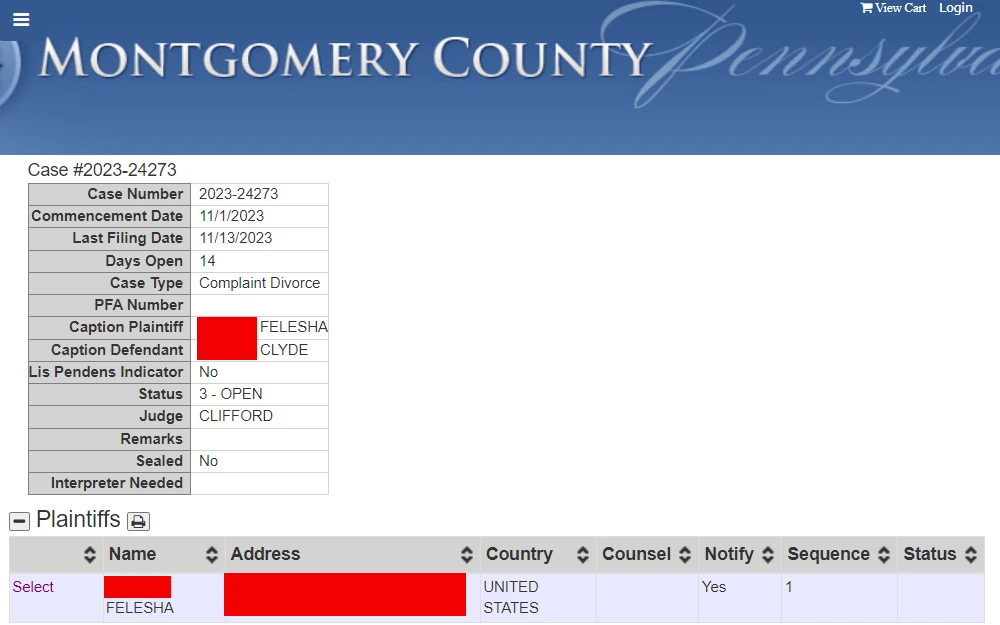
In addition to counties, patrons may turn their search to cities in Pennsylvania. The three most populated cities will serve as an example to search for divorce records; they are Philadelphia, Pittsburgh and Allentown. However, in Pennsylvania, the task of issuing divorce records rests with county agencies.
When searching for divorce records in Philadelphia, interested persons are advised to turn to the Office of Judicial Records. A search on how to find divorce records in Pittsburgh will direct searchers to the Allegheny County Department of Court. Finally, citizens in Allentown who need to view dissolution records will get in touch with the Clerk of Judicial Records.
To find which county agency has jurisdiction of the city and issues divorce documents, perform a Google search with these keywords—“[city name] city divorce records search.”
Citizens may also find archived marriage records in several state and public agencies, which is touched upon in the next section.
Finding Free Divorce Archives in Pennsylvania for Genealogy or Research Purposes
Older divorce records provide helpful information when citizens are investigating their lineage and performing genealogy research and in Pennsylvania, these documents can be found in the State’s Archives, Court of Common Pleas, which are the Prothonotaries, libraries and newspapers.
The Pennsylvania State Archives has digitized family history records by partnering with a third-party vendor; this prior link provides interested persons an opportunity to create an account and commence their search for divorce records.8
Divorces were rare in the state during the colonial period and in early statehood, and the Pennsylvania State Archives contains records at the state level from the Eastern District spanning 1786-1815, Supreme Court Motion Documents from 1750-1837 and dockets between 1800-1805.
Call 717.783.3281 or email [email protected] for more information; requesters may also visit the Pennsylvania State Archives at the location below:
Pennsylvania State Archives
1681 North Sixth Street
Harrisburg, Pennsylvania 17102
County resources provide a viable source to obtain divorce records as the majority of them are in the custody of dissolution documents filed as early as 1804. As an example, Lancaster County has a divorce index of records spanning 1850-1997. Contact the respective Prothonotary Office to find out what archived divorce records they are in possession of—citizens can access these at no cost.
Searchers may also opt to browse archived newspapers that have been digitized through several sources. These include the Pennsylvania Newspaper Archive, which allows users to locate records through newspapers by browsing by title, searching by date, or using an advanced search feature. This resource is free to use.
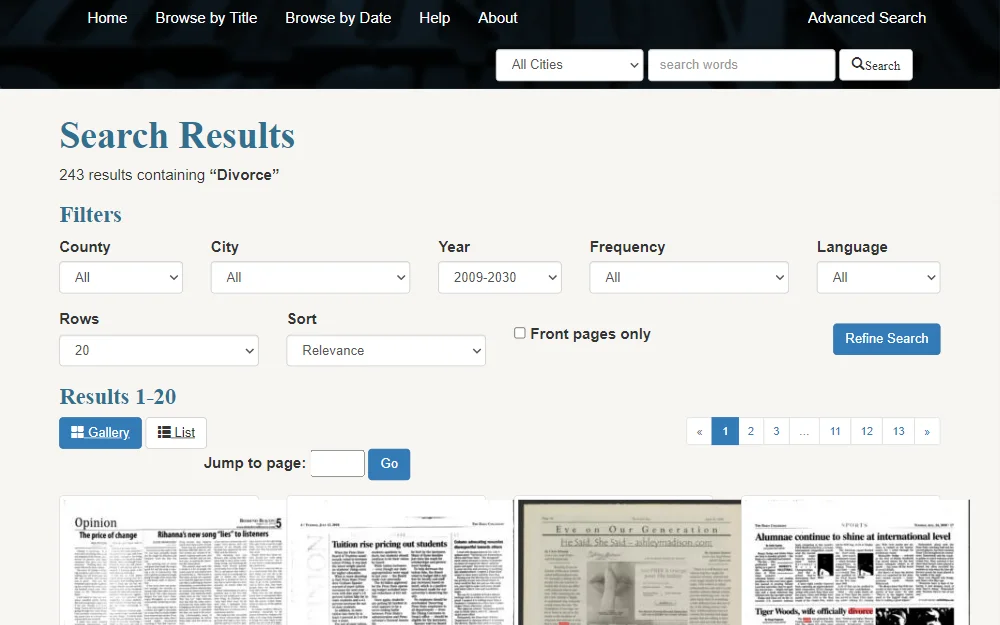
The Library of Congress also has a collection of Pennsylvania digitized newspapers that go as far back as 1789 and can be searched by using keywords. This tool is freely available to the public.
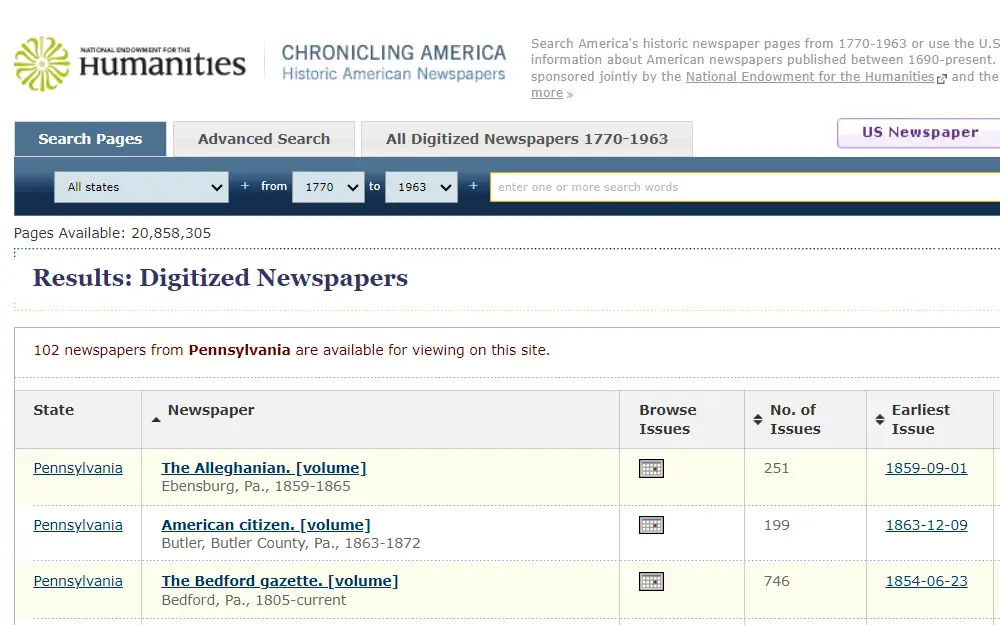
Interested parties may also contact public libraries to run a free public divorce records search.
The Pennsylvania State Library has several digital library collections, such as the
State Library Digital Collections, State Library Electronic Resources and the POWER Library. These resources have online search text boxes in which users can find their records using the relevant keywords for the genealogy research and are all free to use.
There are also other Pennsylvania genealogy libraries that interested persons can contact to find what records that may be in their custody.
How To Search for Dissolutions of Marriage & Common Law Divorces in Pennsylvania (PA)
The quickest way for patrons to find and verify dissolutions would be to contact the Unified Judicial System of Pennsylvania which provides an Online Dissolutions of Marriage Search Tool.11 This instrument is free to use and can search through divorce records from all the Courts of Common Pleas in the Commonwealth in Pennsylvania.
Alternatively, interested parties can go directly to the Pennsylvania Court of Common Pleas which are the Prothonotaries—these courts handle divorce cases and are also the primary custodians for these records. Some of these courts may have online tools to conveniently find dissolution records.
Common law marriages in Pennsylvania were once permitted by law to occur until January 1, 2005, when the state elected to invalidate any of these matrimonial types after that date. However, the state does still recognize those marriages that took place before this date as being lawful.
A common law marriage is a form of union in which the couple does not undergo solemnization or obtain a license. As with regular marriages, couples who are in this type of union may separate either by death or undergoing a dissolution process in the courts. They will divide the assets to deal with issues of child support and custody and alimony (spousal support) if applicable.
With that being said, searching for common law divorces is the same as a query on regular divorces. Verify with the courts what common law dissolution records are in their custody.
As a side note, Pennsylvania does not acknowledge and recognize domestic partnerships or civil unions. However, it is legal for same sex couples to lawfully get married in the Commonwealth.
How To Navigate the Pennsylvania Divorce Process: Filing & Addressing Petitions
Couples who file for divorce in Pennsylvania must meet residency requirements before filing for separation—one party must have resided in the state for six months pursuant to 23 Pa. Cons. Stat. § 3104(b); dissolutions are filed at the Prothonotaries, also known as the Courts of Common Pleas.
The state allows for no-fault and fault-based divorces; no-fault based divorces are those in which the court does not need either spouse to prove the other caused the breakdown of the marriage, such as cases of infidelity or cruel treatment. Fault-based divorces require a spouse to prove the other partner caused the marriage to fall apart, like in cases of desertion.
No-fault divorces are the simpler of the two since there is no need to furnish evidence in court; they can be due to mutual consent in which the couple will file for an Affidavit of Consent or where the couple has lived separate lives for at least a year and agree the nuptial is completely ended.
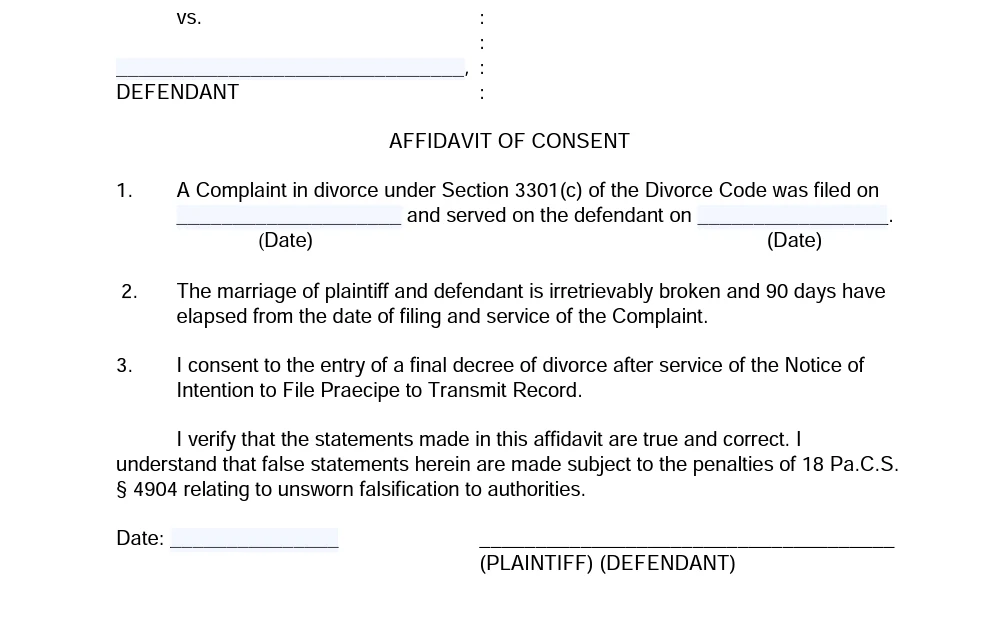
Legal separation, also known as mensa et thoro, is not permitted in Pennsylvania, and couples who need to separate lawfully will need to file for a divorce if they are eligible.
There are two forms of divorce in Pennsylvania: uncontested and contested divorces. The former is much easier and quicker to terminate and occurs when both parties agree to child custody, if applicable, division of assets and spousal support. Contested divorces take a longer time to conclude since both parties have not agreed to the aforementioned matters and must settle these in or out of court.
Couples can get an overview of the divorce procedure from the Unified Judicial System of Pennsylvania. When spouses plan to represent themselves rather than hire a lawyer, they will need to submit an Entry of Appearance of the Self-Represented Party.
Nevertheless, it is advisable to enlist the services of a legal representative during divorce proceedings, particularly if the dissolution is a contested one, due to the need for a thorough understanding of the laws as they relate to the proceedings.
Uncontested Divorce: For an uncontested divorce, one or both spouses can file the dissolution at the county of residence—each county will have their own forms and procedures. These will be obtained from the Pennsylvania Court of Common Pleas which serves the county of interest.
In the majority of the courts, the spouse will file a Notice to Defend & Divorce Complaint Form that notifies the other party that they have filed for divorce. After filing for divorce, the petitioner will need to pay the fees, which typically total between $200 and $300. The petitioner can request a fee waiver if unable to pay.
The couple should have two copies along with the original when filing at the Prothonotary’s Office. After ninety days, the court will finalize the divorce.
Contested Divorce: As with uncontested divorces, proceed to the Pennsylvania Court of Common Pleas that serves the county of residence and obtain and complete the necessary dissolution forms. The spouse may elect to have a mediation where they will meet with a third party who is neutral to resolve their disagreements. If this is successful, they can file an uncontested divorce.
The cost range for filing these dissolution papers is similar to uncontested divorces, and couples may also request a waiver.
Having filed the necessary paperwork, the petitioner will need to serve the divorce papers (copies filed in court) to the other partner. A spouse resident in the state will need to receive the papers in thirty days; if they are out of state, they must receive the dissolution papers in ninety days.
The petitioner can serve the papers in the four ways below:
- For a cooperative spouse, the partner can mail an Acceptance of Service Form.
- The petitioner may send the papers through certified mail and attach the receipt with an Acceptance of Service of Original Process by Mail Form and file this in court.13
- Dissolution papers can be served by a law enforcement official such as a sheriff.
- If unable to locate the partner, the spouse may make a publication in a newspaper and any other court approved method.
After having responded to the dissolution papers, the judge may order the couple to attend hearings held by a divorce master on issues that the spouses don’t agree on; the divorce master will then submit the recommendations to the judge.
If the spouses agree with these recommendations, the judge will, for the most part, approve them and sign the dissolution decree. However, if the spouses reject them, then the divorce will proceed to hearings, and the judge will decide on the disputed items.
The search for Pennsylvania divorce records can be a streamlined process with the tools provided throughout this resource, whether these records are needed for adoption, immigration or for purposes of genealogy research.
References
1Key Health Indicators. National Center for Health Statistics. (n.d.) Retrieved November 15, 2023, from <https://www.cdc.gov/nchs/pressroom/states/pennsylvania/pa.htm>
2Common Pleas. The Unified Judicial System of Pennsylvania. (2023) Retrieved November 15, 2023, from <https://www.pacourts.us/courts/courts-of-common-pleas>
3Civil Docket. The Unified Judicial System of Pennsylvania Web Portal. (2023) Retrieved November 15, 2023, from <https://ujsportal.pacourts.us/Report/MdjDocketSheet?docketNumber=MJ-07101-CV-0000094-2022&dnh=D5XWXXt4DbLzIsN3FWNXvg%3D%3D>
4Judicial Districts. The Unified Judicial System of Pennsylvania. (2023) Retrieved November 15, 2023, from <https://www.pacourts.us/courts/courts-of-common-pleas/judicial-districts>
5Mandatory Electronic Filing. Allegheny County. (n.d.) Retrieved November 15, 2023, from <https://dcr.alleghenycounty.us/>
6Civil/Family Division – Indices. Allegheny County. (n.d.) Retrieved November 15, 2023, from <https://dcr.alleghenycounty.us/indices/indices.html>
7Case Details. Montgomery County, Pennsylvania. (n.d.) Retrieved November 15, 2023, from <https://courtsapp.montcopa.org/psi/v/detail/Case/201360682>
8Ancestry Pennsylvania. Pennsylvania Historical & Museum Commission. (2023) Retrieved November 15, 2023, from <https://www.phmc.pa.gov/Archives/Research-Online/Pages/Ancestry-PA.aspx>
9Search Results. Pennsylvania Newspaper Archive. (n.d.) Retrieved November 15, 2023, from <https://panewsarchive.psu.edu/search/pages/results/?county=&city=&yearRange=2009-2030&frequency=&language=&rows=20&sort=revelance&proxtext=&proxdistance=5&ortext=Divorce&andtext=&phrasetext=&date1=1789-01-01&date2=2013-12-31>
10Digitized Newspapers. Library of Congress. (n.d.) Retrieved November 15, 2023, from <https://chroniclingamerica.loc.gov/newspapers/pennsylvania/>
11Contact Us. The Unified Judicial System of Pennsylvania. (2023) Retrieved November 15, 2023, from <https://www.pacourts.us/contact-us>
12Affidavit of Consent. The Unified Judicial System of Pennsylvania. (n.d.) Retrieved November 15, 2023, from <https://www.pacourts.us/Storage/media/pdfs/20210224/164646-affidavitofconsent-008013.pdf>
13Affidavit of Service of Original Process by Mail. The Unified Judicial System of Pennsylvania. (2023) Retrieved November 15, 2023, from <https://www.pacourts.us/Storage/media/pdfs/20210224/165650-form3baffidavitofserviceoforiginalprocessbymail-004558.pdf>
